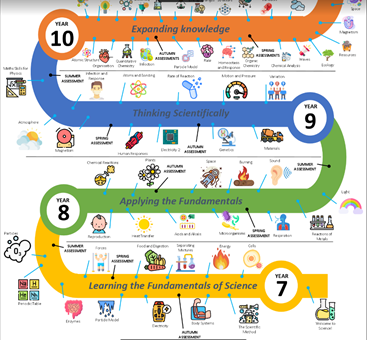Ambition and Intent
School Vision
Building successful futures
School Values
Our approach is Inclusive, developed in line with research and underpinned by our values:
- We are active in our learning and take responsibility for our success
- We are ambitious to achieve beyond expectation
- We are kind to ourselves and others without making excuses.
We are Ambitious, Kind and Active
Curriculum Ambition
To create and deliver a curriculum that ensures all students master the core knowledge necessary to achieve the best possible outcomes and build success in the next stages of their careers, to live happy and healthy lives.
SEN Curriculum Ambition
To ensure SEN students receive the same high quality curriculum with adjustments to the curriculum pedagogy, to ensure they achieve the best possible outcomes and excel in the next stages of their careers and live happy and healthy lives.
Curriculum Intent
We intend our curriculum to support the Trust ambition that we 'inspire learners and change lives'. At the heart of Welling School is a broad and balanced curriculum that focuses on building successful futures for all students. Our core priority is to embed an inspirational curriculum experience which fully ensures students are rich in knowledge, proficient in skill, confident in ability and provides a range of opportunity and experiences to build their cultural capital and aspiration for their future.
Curriculum Drivers
Our curriculum is ambitious, sequenced, develops literacy skills and is under continual review.
Each subject is unique and includes its own core knowledge. We define core knowledge in terms of declarative and procedural knowledge. Declarative knowledge relates to the core facts, ideas and concepts which are central to a subject (for example, the causes of World War one). Whilst, procedural knowledge relates to how scholars and academics within each subject arrive at this knowledge (for example, how mathematicians use a formula). Our curriculum ensures that all students carefully build a comprehensive understanding of both.
At Welling School we think about curriculum at three levels. The first is the intended curriculum; what we intend students to learn. Subject specialists, drawing on the national curriculum and experience of what is necessary to excel in the discipline and map out powerful knowledge needed to succeed in each subject. The second is the implemented curriculum and the resources, pedagogical models and teacher instruction that is used to deliver the curriculum. The third is the impact of the curriculum. We regularly review our curriculum to ensure students progress and gain powerful knowledge over time.
Academic progress is essential but it is not the only definition of success. Students are actively encouraged to pursue their interests through the curriculum, extra-curricular activities, visits and events. We understand that in order for students to be prepared for the next stage of education and life they need confidence and development of core skills.
To this end, we have developed a thorough Personal Development approach which intertwines with our academic curriculum to cover key aspects of SMSC, PSHE, RSE, careers, and citizenship. There are four discreet strands to our strategy: tutor time, assemblies and drop-down days, PD lessons and curriculum enrichment (including trips and visits, outside speakers, extra-curricular clubs and other events/competitions). In addition to these, students benefit from the conscious interleaving of Personal Development topics within the academic curriculum across all subject areas, allowing them to appreciate the relevance and wider application of these skills and competencies and thus embed them more securely.
Learning Journeys
Our learning journeys build students' capacity to recall and apply core knowledge in order to progressively master more difficult content. Learning Journeys ensure our curriculum is correctly sequenced and progressively allows students to master and revisit core knowledge in order achieve the best possible outcomes and excel in the next stages of their careers. They provide opportunities for students to revisit and master their knowledge in order to be successful in their academic pursuit and later lives.

Visible Curriculum Maps (VCMs)
The design of our visible curriculum maps is to improve the clarity of communication of the ‘big picture’ from leader to teacher, and consequently from teacher to student. It provides a thinking and a evaluative review process for us all. This draws teachers to plan and sequence their curriculum in the following way:
- What? What are we learning? What’s interleaved?
- Why/Why now? What skills or knowledge does this learning build on?
- How? Will the curriculum pedagogy and practice be implemented?
- How well? What should students be able to know? What should students be able to do?
- Where next? Signposts students. How does this link this to ‘The Journey’? How does this link to what they do next?
The VCMs support our school improvement to embed an inspirational curriculum experience which ensures students are rich in knowledge, proficient in skill and confident in ability. Sequencing the curriculum supports co-curricular activities that provide a range of opportunities and experiences to build students’ cultural capital. The constant process of monitoring, evaluating and reviewing allows the school to keep the curriculum under continual review. As Dylan Wliam states, ‘It should be recognised that curriculum development is not something that is done periodically. It is part of every school’s regular cycle of improvement and renewal’.
